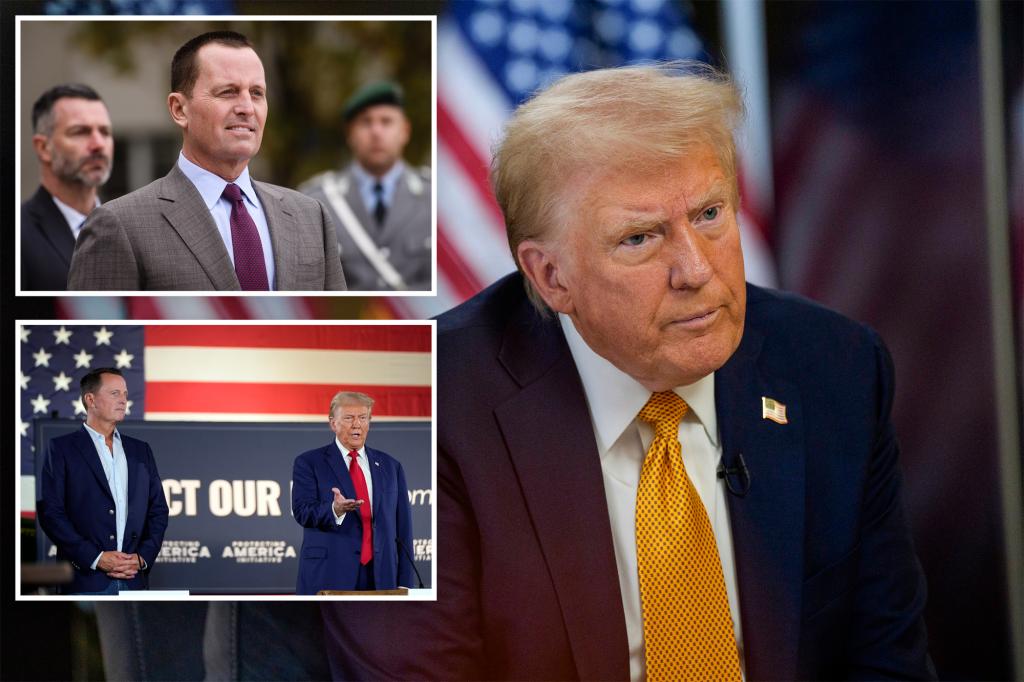Richard Grenell’s appointment as Presidential Envoy for Special Missions marks a significant development in the unfolding narrative of Donald Trump’s prospective second term. Grenell, a seasoned diplomat and staunch advocate of Trump’s “America First” philosophy, brings a wealth of experience to the role, having previously served as the US Ambassador to Germany, Acting Director of National Intelligence, and Presidential Envoy for Kosovo-Serbia Negotiations. His familiarity with international affairs, particularly concerning North Korea, and his proven track record within the Trump administration make him a seemingly natural choice for this crucial position. The appointment underscores Trump’s continued reliance on loyalists and individuals who share his worldview. Grenell’s deep understanding of Trump’s foreign policy priorities, coupled with his experience navigating complex international situations, positions him to play a key role in advancing the administration’s agenda on the global stage.
Grenell’s credentials extend beyond his diplomatic roles. His eight years of service within the United Nations Security Council provided him with invaluable insight into international diplomacy and conflict resolution. This experience, combined with his academic background, which includes a Master’s in Public Administration from Harvard University, equips him with the analytical and strategic thinking necessary to tackle the challenges inherent in the envoy role. Trump’s explicit mention of Grenell’s commitment to “Peace through Strength” further emphasizes the administration’s anticipated approach to foreign policy, suggesting a focus on projecting American power and influence to achieve diplomatic objectives. The selection of Grenell, therefore, signifies not only a personnel decision but also a reaffirmation of the Trump administration’s core foreign policy principles.
The appointment also carries historical significance. Grenell’s previous appointment as Acting Director of National Intelligence made him the first openly gay individual to hold a cabinet-level position. This appointment further solidifies his place as a trailblazer within the Republican Party and the broader political landscape. While his sexual orientation has previously drawn criticism from some conservative groups, his continued elevation within the Trump administration reflects a growing acceptance of LGBTQ+ individuals in prominent political roles. Grenell’s subsequent role as a senior advisor for the Republican National Committee, focusing on LGBTQ voter outreach, demonstrates his commitment to bridging divides within the party and expanding its base of support.
Beyond Grenell’s appointment, Trump also announced several other key positions, each contributing to the overall composition and direction of his potential second administration. Bill White, a businessman and former president of the Intrepid Sea, Air & Space Museum, has been nominated to serve as the US Ambassador to Belgium. This appointment suggests a focus on maintaining strong transatlantic relations and underscores the importance of Belgium as a key NATO ally. White’s business acumen and experience leading a prominent cultural institution likely factored into his selection, indicating a desire for skilled and experienced individuals in diplomatic roles.
The selection of Troy Edgar, an IBM executive and former Department of Homeland Security official, as Deputy Secretary of DHS further emphasizes the administration’s focus on national security. Edgar’s background in technology and his prior experience within DHS provide him with the expertise necessary to address the evolving threats facing the nation, including cybersecurity and border security. This appointment underscores the administration’s commitment to leveraging technological advancements and expertise to enhance national security measures.
Finally, the appointment of Devin Nunes, CEO of Truth Social, to head the President’s Intelligence Advisory Board is particularly noteworthy. Nunes, a former Congressman and staunch Trump ally, brings a unique perspective to the role. His familiarity with intelligence matters, combined with his loyalty to the president, positions him to play a key advisory role on critical intelligence issues. This appointment further solidifies the close relationship between Trump and Nunes and suggests a continued focus on intelligence gathering and analysis as a key component of national security strategy.
In sum, these appointments paint a picture of a prospective Trump administration that prioritizes loyalty, experience, and a commitment to “America First” principles. The selection of individuals with diverse backgrounds and expertise, ranging from diplomacy and national security to technology and business, suggests a desire to assemble a team capable of addressing the complex challenges facing the nation on both the domestic and international fronts. These appointments mark a significant step in shaping the potential second term of the Trump presidency and offer insight into the administration’s priorities and anticipated direction. The individuals chosen reflect a blend of established figures within the Trump orbit and newcomers with specific skill sets, suggesting a strategic approach to building a team capable of executing the president’s vision.

